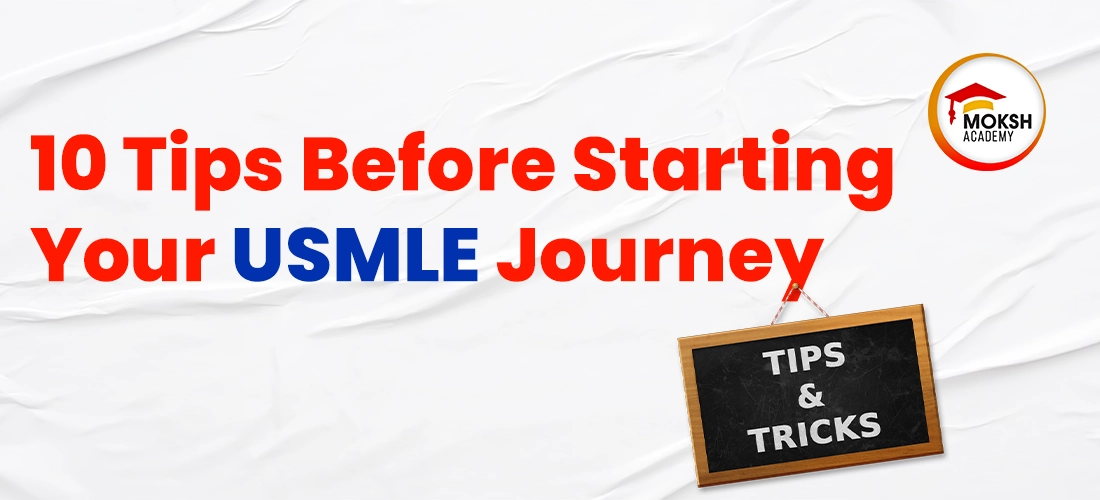-
Nov 10, 2023
-
MOKSH Academy

The USMLE exam is a vital and challenging exam for medical students and graduates who want to practice medicine in the United States. It evaluates your medical knowledge, skills, and abilities across various domains of medicine. It also influences your eligibility and competitiveness for Residency Programs and specialty fields. Therefore, preparing for the USMLE exam demands a lot of commitment, hard work, and smart strategies. But don’t worry, you are not alone in this journey. We at MOKSH Academy are here to assist you and guide you through every step of your USMLE preparation. We are a trusted source for USMLE exam preparation, offering you the best resources, coaching, and tips to help you achieve your desired score. In this blog post, we will share with you the top 10 tips that can significantly enhance your USMLE preparation and performance. These tips are based on our experience and expertise in helping thousands of students succeed in the USMLE exam. Whether you are just starting your USMLE journey or already in the middle of it, these tips will help you optimize your study plan, avoid common pitfalls, and boost your confidence. So, let’s get started!
- Enjoy the journey, not the destination. The USMLE exam is not just a test, it is a learning opportunity. It is a chance to broaden your knowledge, improve your skills, and grow as a medical professional. Therefore, instead of worrying about the final outcome, enjoy the process of learning and preparing for the exam. Appreciate every step, and maintain a positive mindset. Start with step one, and take things one at a time. Don’t compare yourself to others, or let the pressure get to you. Remember, the journey is more important than the destination.
- Start preparing early. Once you have decided to take the USMLE, it is vital to start preparing early. The earlier you start, the better, as this will give you more time to study and master the material. Timely preparation can help you improve your academic performance in medical school and Build a Strong CV with the guidance of MOKSH Experts.
- Build a good rapport with your USMLE colleagues. Maintaining a good rapport with your USMLE colleagues can help you in many ways. They can provide references, help you obtain documents, or be colleagues at your future workplace. Building a solid network is always beneficial, as it can also help you get letters of recommendation, research assistance, and the latest updates. Maintaining good rapport with your USMLE colleagues is an investment that will pay off in the long run. Being friendly, helpful, and supportive can build relations that will help you throughout your career.
- Take each exam seriously, as you have only one shot at each exam. Your results can have a significant impact on your career as a physician. If you fail, it would be a red flag in your CV. Therefore, only opt for it once you are fully prepared.
- Your hobbies and extracurricular activities reveal a lot about you. So, not only the scores matter but also how you are as a person. Don’t lie. Be honest about your hobbies. Research, clinical trials, updates, and collaborations with your colleagues can give you a boost. Learn and do it yourself, as you will learn more. Research analysis, literature review, etc., are also critical.
- Present yourself as a well-rounded candidate, and highlight your involvement in volunteering, research, and hobbies that demonstrate your passion outside medicine. These activities reflect your genuine interests and show who you are.
- It is best recommended that you take Step 1 in your third year of medical school and Step 2 CK during your internship. It is because Step 1 covers a lot of biochemistry and microbiology topics that you will learn in your preclinical years. Step 2 CK tests the clinical knowledge and skills you will acquire during your rotations and internship. Taking these exams at the appropriate time will help you prepare better and score higher.
- Apply for electives early during your internship, as they can give you valuable clinical experience and exposure to the US healthcare system. Electives are rotations for medical students who have yet to graduate and can interact with patients under supervision. If you cannot go for electives, do not worry. You can still go for externships after graduation. Externships are similar to electives, but they are for graduates who still need to be matched. Some prestigious institutions like Mayo Clinic offer externships that can enhance your CV. However, externships are less common and more competitive than electives. Observer ships are another option, but they are the least preferred. Observer ships are rotations where you can only observe or shadow the doctors without direct patient contact. They are easier to get, but they provide little clinical experience or letters of recommendation. Therefore, the best option is electives, followed by externships, and then observer ships.
- Before you apply for residency, focus on your clinical experience, research, and Step 3 exam. These are the most critical factors that program directors look for in applicants. Clinical experience shows your competence and skills in handling patients and working in a team. Research demonstrates your academic potential and contribution to the field of medicine. Step 3 is the final USMLE exam that tests our ability to apply medical knowledge and practice independently. A good score on Step 3 can boost your chances of matching, especially if you have a low score on Step 1 or Step 2 CK. Communication is also a critical skill that program directors value. You should be able to speak well and express yourself clearly and confidently. Good communication skills can help you ace your interviews and impress your evaluators.
- You should have a well-written CV and personal statement in your application. Your vocabulary is essential. Use consistent and relevant headings for your specialization. You should sell yourself in words and highlight your strengths and achievements. You should practice and read to improve your language and expression in your statement. It has to be personal and honest, matching the wavelength of the program you are applying to. You do not have to be the best speaker or writer, but you should be able to communicate effectively and convincingly. Our monthly expert guidance on CV-building sessions is a solution for all.
We hope that this blog post has been helpful and informative for you. Preparing for the USMLE exam is a challenging but rewarding journey that can open many doors for your medical career. By following these 10 tips from MOKSH Academy, you can optimize your study plan, avoid common mistakes, and boost your confidence. You can also benefit from our expert guidance, coaching, and resources that can help you achieve your desired score. If you have any questions or feedback, please feel free to contact us. We are always happy to hear from you and assist you in any way we can. Thank you for reading and good luck with your USMLE preparation!




